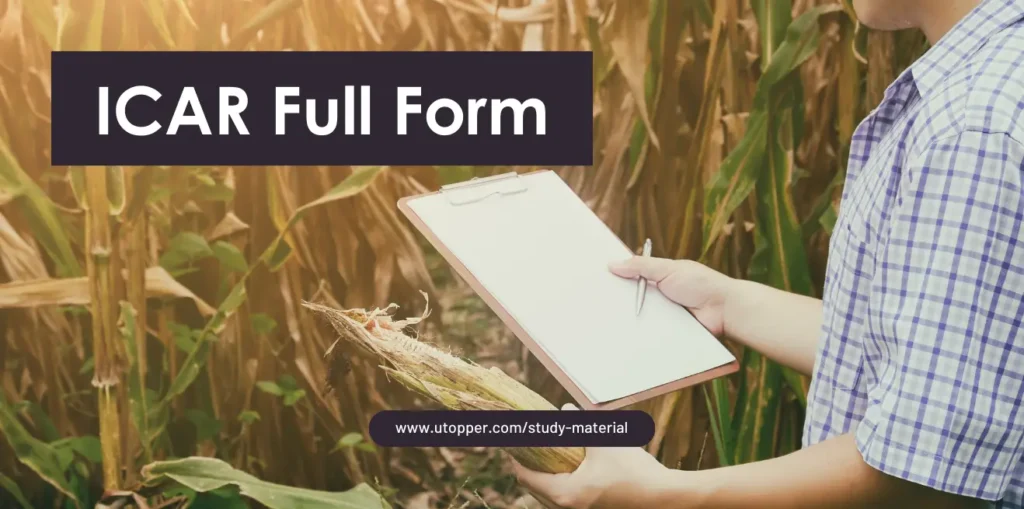ICAR Full Form: Understanding the Meaning of ICAR
ICAR FULL FORM- Are you interested in the field of agriculture? Have you ever come across the term ICAR and wondered what it stands for? In this article, we will explore the full form of ICAR, its history, objectives, and functions.
Read Our Other Full Forms

Introduction
The Indian Council of Agricultural Research (ICAR) is a premier research organization that aims to promote agricultural research and education in India. Established in 1929, it operates under the Ministry of Agriculture and Farmers Welfare, Government of India. In this article, we will delve deeper into the meaning of ICAR, its objectives, functions, and more.
What is ICAR?
ICAR stands for the Indian Council of Agricultural Research. It is an autonomous organization that works towards the development of agricultural education and research in India. ICAR is headquartered in New Delhi and operates through a network of institutes, research centers, and universities across the country.
History of ICAR
ICAR was established on 16 July 1929, as a registered society under the Societies Registration Act, 1860. The council was set up to coordinate, guide, and manage agricultural research and education in India. Its establishment was a result of the Royal Commission on Agriculture, which was set up in 1926 to examine the status of agricultural research in India.
Objectives of ICAR
The primary objective of ICAR is to promote and develop agricultural research and education in India. Some of the other objectives of ICAR include:
- To conduct and promote research in the field of agriculture and allied sciences
- To provide education and training in agriculture and related disciplines
- To develop and promote technologies for sustainable agriculture
- To disseminate information and knowledge related to agriculture
Functions of ICAR
ICAR performs a wide range of functions to fulfill its objectives. Some of the major functions of ICAR include:
- Conducting research in various fields of agriculture and allied sciences
- Developing and promoting technologies for sustainable agriculture
- Providing education and training in agriculture and related disciplines
- Disseminating information and knowledge related to agriculture
- Collaborating with national and international organizations for research and development in agriculture
Organizational Structure of ICAR
ICAR has a complex organizational structure, with multiple levels of management and decision-making. The council is headed by a Director-General, who is assisted by several Deputy Directors-General and Assistant Directors-General. ICAR also has several divisions and bureaus, each of which is responsible for a specific area of research and development in agriculture.
ICAR Institutes and their Mandates
ICAR operates through a network of institutes, research centers, and universities across the country. Each of these institutions has a specific mandate and focus area. Some of the major ICAR institutes and their mandates include:
- Indian Agricultural Research Institute (IARI): Focuses on research and education in the field of agricultural sciences.
- National Dairy Research Institute (NDRI): Focuses on research and education in the field of dairy science.
- Central Soil Salinity Research Institute (CSSRI): Focuses on research and development related to saline and alkali soils.
- Central Institute of Fisheries Education (CIFE): Focuses on research and education in the field of fisheries science.
- National Institute of Veterinary Epidemiology and Disease Informatics (NIVEDI): Focuses on research related to animal health and disease management.
ICAR Exams and Admissions
ICAR conducts various entrance exams for admission to its undergraduate and postgraduate programs in agriculture and allied sciences. Some of the major ICAR exams include the All India Entrance Examination for Admission (AIEEA) and the ICAR National Eligibility Test (NET).
ICAR in the Context of Agricultural Development in India
ICAR has played a significant role in the development of agriculture in India. Through its research and education programs, ICAR has contributed to the development of new technologies and practices in agriculture, which have helped to increase productivity, improve food security, and promote sustainable agriculture.
Challenges and Criticisms of ICAR
Despite its achievements, ICAR has faced several challenges and criticisms over the years. Some of the major challenges and criticisms include:
- Insufficient funding for research and development in agriculture
- Limited access to advanced technologies and equipment
- Lack of coordination and collaboration among various research institutions
- Limited engagement with farmers and rural communities
Future of ICAR
As India continues to face challenges related to food security, climate change, and rural development, ICAR will play an important role in addressing these challenges. In the coming years, ICAR will need to focus on strengthening its research and education programs, promoting innovation and collaboration, and engaging with stakeholders to promote sustainable agriculture.
Conclusion
ICAR is a critical organization in the field of agriculture and allied sciences in India. Through its research and education programs, ICAR has contributed significantly to the development of new technologies and practices in agriculture. As India continues to face challenges related to food security, climate change, and rural development, ICAR will play an important role in addressing these challenges.
Frequently Asked Questions
Q.1 What is the full form of ICAR?
The full form of ICAR is Indian Council of Agricultural Research.
Q.2 When was ICAR established?
ICAR was established on 16 July 1929.
Q.3 What are the objectives of ICAR?
The primary objective of ICAR is to promote and develop agricultural research and education in India.
Q.4 What are some major ICAR institutes and their mandates?
Some major ICAR institutes and their mandates include IARI (agricultural sciences), NDRI (dairy science), CSSRI (saline and alkali soils), and CIFE (fisheries science).
Q.5 What are some of the challenges and criticisms of ICAR?
Some of the major challenges and criticisms of ICAR include insufficient funding for research and development in agriculture, limited access to advanced technologies and equipment, and lack of coordination and collaboration among various research institutions.

